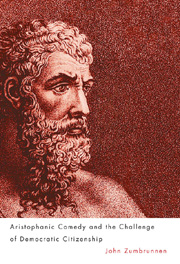Book contents
- Frontmatter
- Contents
- Acknowledgments
- Introduction
- 1 Peaceful Voyages: Peace and Lysistrata
- 2 Ordinary Citizens, High Culture, and the Salvation of the City: Clouds, Women at the Thesmophoria, and Frogs
- 3 Archē and the Anger of the Ordinary Citizen: Wasps and Birds
- 4 Elite Domination and the Clever Citizen: Acharnians and Knights
- 5 Fantasy, Irony, and Economic Justice: Assemblywomen and Wealth
- Conclusion: Democratic Possibilities
- Notes
- Bibliography
- Index
3 - Archē and the Anger of the Ordinary Citizen: Wasps and Birds
Published online by Cambridge University Press: 05 February 2013
- Frontmatter
- Contents
- Acknowledgments
- Introduction
- 1 Peaceful Voyages: Peace and Lysistrata
- 2 Ordinary Citizens, High Culture, and the Salvation of the City: Clouds, Women at the Thesmophoria, and Frogs
- 3 Archē and the Anger of the Ordinary Citizen: Wasps and Birds
- 4 Elite Domination and the Clever Citizen: Acharnians and Knights
- 5 Fantasy, Irony, and Economic Justice: Assemblywomen and Wealth
- Conclusion: Democratic Possibilities
- Notes
- Bibliography
- Index
Summary
In chapter 2, I sought to complicate the idea of ordinary citizenship chiefly by emphasizing the fluidity of the ordinary. Though Aristophanes's plays revolve around the relationship between ordinary citizens and cultural or political elites, they at the same time resist the reification (or deification) of ordinary citizens. This, I suggested, is one way in which Aristophanes avoids what today we might think of as uncritical populism, cultural or political. Insofar as they allow the meaning of ordinary to shift, the plays render problematic any simplistic celebration of the ordinary.
I return to these arguments about the identity of the ordinary citizen in chapter 5. In the present chapter (and in chapter 4), I focus more intently on a different set of issues raised at the end of chapter 2. I there briefly highlighted Frogs' simultaneous emphasis on equality and kinship among the Athenians and on the necessity of elevating some citizens above the rest as “the right leaders.” In this we might see another aspect of Aristophanes's distance from uncritical populism. Though his plays take ordinary citizens as their heroes and heroines, they do not simply reject any role for elites, thereby endorsing popular rebellion against all claims of political authority. Indeed, Aristophanes most often seems to assume the presence of elites in democratic politics and to focus his attention instead on how ordinary citizens might act in this context. In the present chapter, I focus on a seemingly common response of the ordinary citizen to the perceived dominance of elites: anger.
- Type
- Chapter
- Information
- Publisher: Boydell & BrewerPrint publication year: 2012



